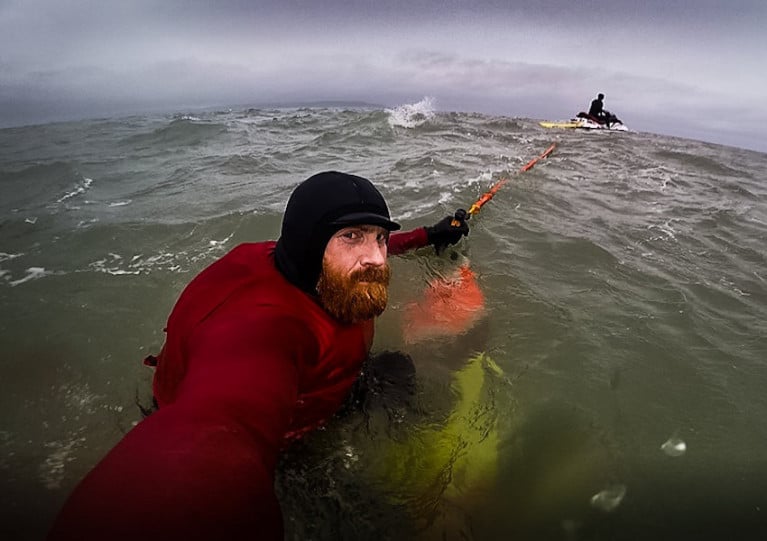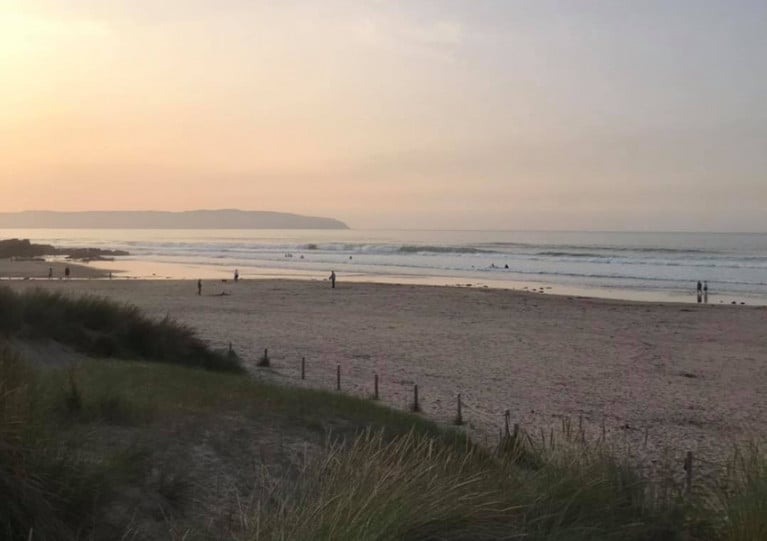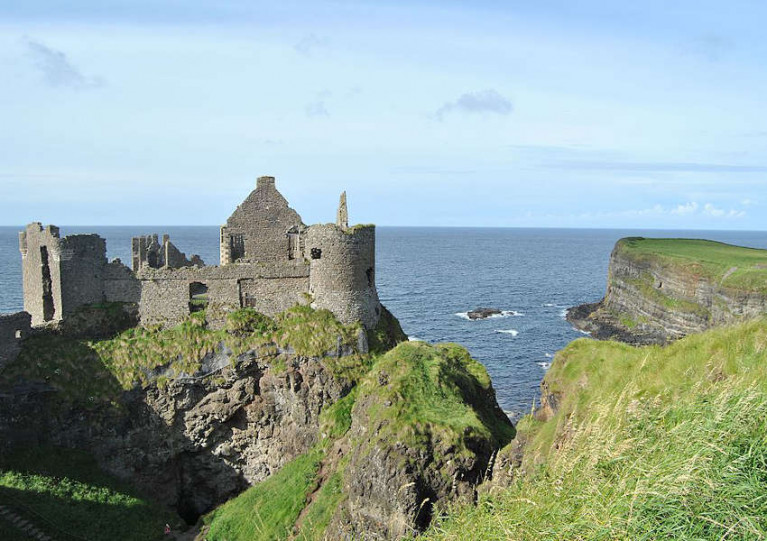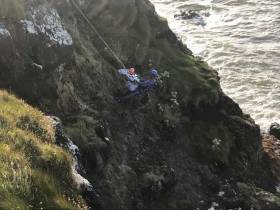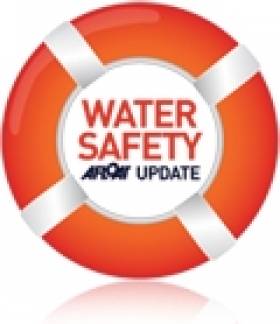Displaying items by tag: North Coast
A new TV series as Gaeilge follows presenters Tessa Fleming and Irial Ó Ceallaigh as they embark on an epic adventure paddling their way along the North Coast.
Together with kayaking expert John Hubbocks, the novice kayakers brave the unpredictable Atlantic wind and waves, pushing themselves beyond their comfort zones to complete their challenge.
This four-part series Kayak-Ó-Thuaidh, made by Macha Media for BBC Gaeilge and RTÉ with support from Northern Ireland Screen’s Irish Language Broadcast Fund, showcases the stunning scenery of the northern Atlantic coastline, its rich history and the people who call it home.
Tessa and Irial face many challenges along the way and draw on their inner strength and physical stamina to navigate storms, tides and physical injuries, as they paddle from northwest Donegal to the northeast coast of Co Antrim.
In the first episode, on BBC iPlayer and BBC Two Northern Ireland on Monday 11 March at 10pm, the presenters undergo difficult training sessions in Co Down before starting their journey at Bunbeg harbour in Co Donegal. Their first challenge takes them to Gola Island and then to the Bloody Foreland in Gaoth Dobhair.
Episode two continues with a challenging paddle that takes them from Magheraroarty Beach to Tory Island and on to Sheephaven Bay, concluding at the iconic lighthouse on the edge of the Fanad peninsula.
Our adventurers tackle the Inishowen peninsula in episode three, setting off from Fort Dunree they make their way to Inishtrahull, Ireland’s most northerly island, and continue eastwards towards Lough Foyle and Magilligan.
In the final episode, Tessa and Irial embark on the last leg of their journey from Magilligan to Ballycastle, with one last push taking them to the spectacular wildlife haven of Rathlin Island.
Kayak Ó Thuaidh starts on Monday 11 March at 10pm on BBC iPlayer and BBC Two Northern Ireland. All four episodes will be available to watch for viewers in Northern Ireland on BBC iPlayer from this date.
Enthusiasts of surfing, sea kayaking and coasteering are being asked to contribute to a project collecting data about Northern Ireland’s marine wildlife.
As the Coleraine Chronicle reports, National Museums NI’s Centre for Environmental Data and Recording (CEDaR) hopes that the North Coast’s surfing community in particular will join the effort to help full the gaps in marine science experts’ knowledge of NI’s coastal ecosystem.
“We are interested in just about every marine species,” says CEDaR marine biodiversity officer Justin Judge, “from the more charismatic animals like minke whales and dolphins, down to seaweed and inter-tidal invertebrates”
The Coleraine Chronicle has more on the story HERE.
Shipwreck divers have been warned not to disturb two protected sites off Northern Ireland’s North Coast, as the Newry Times reports.
Wreck diving has become a popular pastime this summer due to prolonged periods of sunshine and calm seas.
But suspected diving activity at a restricted site near Portballintrae has prompted an advisory to anyone tempted to explore Northern Ireland’s shipwrecks.
Divers are reminded that access to the wreck of La Girona, a Spanish Armada warship sunk more than 430 years ago, is restricted to licensed dives only on threat of prosecution.
Meanwhile, explorers of the HMS Drake, a WW1 cruiser sunk by a German U-boat in Rathlin Bay in 1917, may not remove artefacts from the wreck without prior consent. The Newry Times has more on the story HERE.
NI Surf Pro Al Mennie Battles Blaze on North Coast Beach
Northern Ireland surfing pro Al Mennie was among the volunteers who joined fire fighters battling a gorse blaze on Castlerock Beach in Co Derry last night (Tuesday 30 March).
As the Belfast Telegraph reports, 40-year-old Mennie was out catching the waves minutes from his home when he noticed the fire break out around 8pm.
The surfer then teamed up with a group of teenagers to attempt to dampen the flames with sand before the arrival of the Northern Ireland Fire and Rescue Service.
The Belfast Telegraph has more on the story HERE.
Swimmers & Surfers On NI’s North Coast Urged ‘To Be Extra Vigilant’ As Summer Lifeguard Service Ends
With the RNLI’s summer lifeguard service now ended for 2020, swimmers and surfers on Northern Ireland’s North Coast have been urged “to be extra vigilant”.
The warning from Coleraine Coastguard comes after three swimmers got into difficulty at Castlerock Beach on Friday (18 September).
One swimmer made it to shore while the others were helped ashore by a local surfer. All three were medically assessed by coastguard officers and the NI Ambulance Service.
The casualties were “shocked” by their ordeal “but thankfully fit and well”, Coleraine Coastguard said later.
“Conditions on our beaches can change quickly and strong currents are currently running with the high tides,” the coastguard added.
“Now that the summer lifeguard service has ended around most of our beaches, we urge people to be extra vigilant when swimming or surfing.
“If you see anyone in difficulty, don’t hesitate to dial 999 [and ask for the] coastguard.”
Teenager Dies In Swimming Incident Off North Coast
RTÉ News reports that a teenager has died after a group of sea swimmers got into difficulty off the North Coast in Northern Ireland yesterday afternoon, Tuesday 16 June.
The young man was part of a group that was reportedly coasteering in the area close to Dunluce Castle, according to the Guardian, which added that local coastguard teams described the incident as a “freak accident”.
Judith McNeice, a spokesperson for the Maritime and Coastguard Agency, said the teen’s friends made “valiant efforts to try and save him”, but after he was taken from the water by Portrush RNLI volunteers he was pronounced dead at the scene.
RTÉ News has more on the story HERE.
Stranded Teen Rescued From North Coast Cliff Base
#Rescue - Coleraine Coastguard rescued a teenage girl who was stranded at the base of a 100ft cliff at Castlerock yesterday evening (Monday 24 July).
The coastguard rescue team was tasked to Castlerock following a report of two girls cut off by the tide, one of whom was reported as having been injured.
Ballycastle Coastguard, both Portrush lifeboats and RNLI lifeguards in the area were also tasked to assist.
The lifeguards managed to locate one teenage girl at the base of the cliff, just below the caravan park.
One lifeguard and one crew member from the inshore lifeboat landed on the rocks to assist the stranded girl, who was by that point hypothermic, distressed and exhausted from having tried to swim to safety.
She had also sustained a number of abrasions from making contact with the rocks.
Although the spring tide was rising rapidly, her condition made a rescue by sea very difficult. It was therefore decided to carry out a rope rescue.
A coastguard rope rescue technician descended the cliff and brought the stranded girl to safety, just as the waves broke over the rocky platform where she was stranded.
The teenager was soon reunited at the cliff top with her parents and with her friend, who had managed to swim to safety and had raised the alarm.
Both girls were taken to hospital by ambulance as a precaution against secondary drowning.
The coastguard later found two teenage boys had been with the girls, sustaining lacerations and abrasions as they tried to cross the rocks towards Castlerock beach.
Earlier in the evening, Coleraine Coastguard was tasked to White Rocks in Portrush where a four-year-old boy had sustained a head injury on the rocks.
On arrival it was found that the RNLI lifeguards on duty had assisted the child and delivered him into the care of the NI Ambulance Service.
Surf's Up For Award-Winning North Coast
#NorthCoast - Ireland's North Coast – one of the island's emerging surfing hotspots – was the big winner at the 2016 OutdoorNI Awards, as the Coleraine Times reports.
A third of the accolades presented on the night went to activities and locations around the Portrush coastal region, as voted on by the public.
Among them was the song for Best Coastal Experience, awarded to Troggs surf school in Portrush – while the Causeway Coast & Glens was named Best Adventure Destination for its abundance of opportunities not just for surfing and sea kayaking but also hiking and coasteering.
The Coleraine Times has more on the story HERE.
#WaterSafety - The RNLI is advising anyone planning on visiting its lifeguarded beaches on the North Coast to stay well away from dangerous cliff edges that have been impacted by recent weather conditions.
Winter storms have dramatically changed the profile of beaches at Whiterocks, Portrush East and Portstewart, creating high sand cliffs that are unstable. RNLI lifeguard manager Mike Grocott is asking the public to be mindful of the changes ahead of making a visit.
"Winter storms have taken their toll on the make-up of some of the beaches this year, particularly at Whiterocks, Portrush East and Portstewart, and many people returning to these favourite spots may be surprised at how different everything looks.
"This includes significant erosion of the sand dunes where gentle slopes have washed away leaving sheer sand cliffs, some of which are up to 18 feet high.
"Access points have been altered and on some beaches the shifting sand has left deep channels that in turn create strong rip currents.
"We would encourage anyone planning a trip to one of these beaches to put safety first and be mindful that these sand cliffs are falling away and may be unstable. The best advice is to stay away from the sand cliff edges and bases."
Meanwhile, RNLI lifeguards are busy preparing for a new season where they will be patrolling 10 beaches in Northern Ireland during the summer. Last year RNLI lifeguards responded to 251 incidents, assisting 284 people.


























